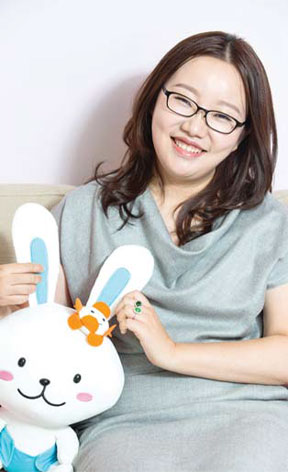Cyber biz runs on mommy power
Billion-dollar startup mia.com, started by a new mother, symbolizes entrepreneurial spirit
Former stay-at-home mother Liu Nan, 32, clearly remembers the first day of her online baby products business on Taobao.com in 2011: Sales reached a stunning 60,000 yuan ($9,210; 8,407 euros).
In its second year, Miya Baobei (Chinese for sweet bud baby), her online shop on Taobao.com, rang up 13 million yuan in sales of products like diapers, baby formula, toys and garments.
That convinced a venture capital firm to invest 8 million yuan in March 2014 in Liu's mia.com, a Beijing-based cross-border e-commerce firm that has received four rounds of funding and is now valued at more than $1 billion.
Welcome to China's Internet-based businesses, a universe of entrepreneurial ideas, mushrooming startups and surging valuations.
Mia.com sources overseas branded baby and mom products, including health supplements for women, and resells them online, mostly to middle-class Chinese parents.
|
Liu Nan, founder of mia.com, says she was lucky to tap into the imported baby products sector before it became a big thing in China's e-commerce world. Provided to China Daily |
"I'd say I was lucky to tap into the imported baby products sector before it became a big thing in China's e-commerce world," Liu says.
An increasing number of companies are jumping onto the online bandwagon of foreign baby products in anticipation of a baby boom with the scrapping of China's one-child policy late last year.
This has led to cutthroat competition and price wars. But Liu's mia.com has held onto its top spot despite the presence of China's e-commerce heavyweights such as Alibaba Group Holding Ltd and JD.com Inc.
"Unlike large e-commerce platforms, which see baby products as an important sector to boost their overall sales, we are dedicated to helping middle-class families access the best mom and baby products from abroad. That is the only thing we do," Liu says.
Being the mother of a 5-year-old girl not only helped Liu spot the business opportunity but also gives her an understanding of the products. She once teased a male competitor: "Everybody is discussing diapers as if you (men) really understand diapers, as if you had touched one before."
However, she says she is aware the company needs to evolve. "We need to transform ourselves from a company that is based on the dreams of a group of moms into a masculine firm that is able to bleed, fight and invade," she says.
According to mia.com, its sales surged to 2.5 billion yuan in 2015, up sevenfold from 2014. Liu predicts this year's sales will be around 6 billion yuan.
"The rapid development of the company raises the bar for management. When you think out of the startup box, you find that you need people with more experience and vision," she says.
At the start of 2015, 80 percent of mia.com's senior executive team were women. By November, 60 percent were men.
Beijing-based Internet consultancy Analysys International says the market for baby and mom products in China was valued at 2 trillion yuan in 2015, rising to 3 trillion yuan by 2018.
"There is still a lot of potential for growth in the market for baby and mom products," Liu says. "It is high time we expand to offline channels as well, as more than 50 percent of sales are generated by brick-and-mortar stores."
Late last month, Liu announced mia.com partnerships with Amcare Corp, a leading private women and children's hospital chain in China, and Yuyuto Shanghai Entertainment Facilities Co, which runs more than 200 indoor theme parks for children. The partnerships will enable mia.com to reach more parents and would-be parents. In early 2015, mia.com set up a joint venture with RYB Education Institution, which runs dozens of kindergartens in China.
"Baby and mom products constitute a so-called connecter industry. Higher up is the medical industry that takes care of the birth of babies. Lower down is the education industry," Liu says.
Her dream is to make mia.com the go-to firm for pregnant Chinese women and even those considering motherhood.
Women in the Era of Internet Plus, a 2015 report by AliResearch of Alibaba Group, showed that women were running more than half of the shops on Taobao.com and Tmall.com, two of the leading e-commerce websites in China. Women-owned shops accounted for more than 46 percent of online transactions in 2014.
"As China shifts from manufacturing to services, women who are blessed with a strong acumen to deal with the outside world will become increasingly important participants in China's economy," says Shi Dongwei, vice-president of Alibaba.
mengjing@chinadaily.com.cn



















